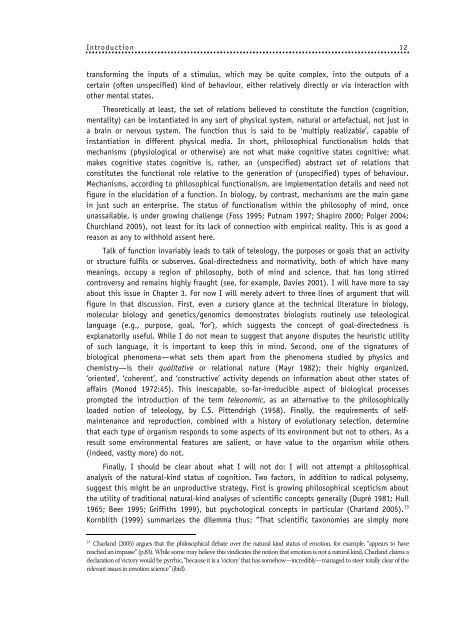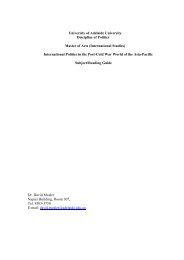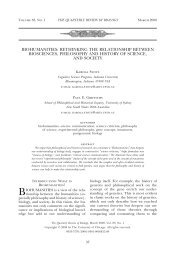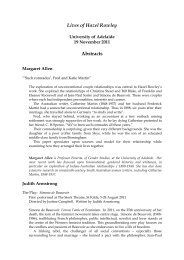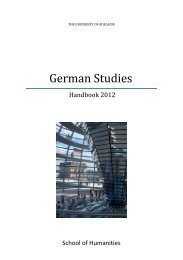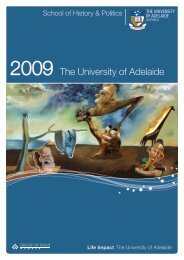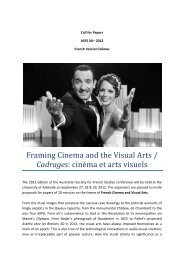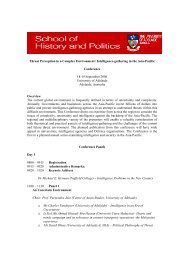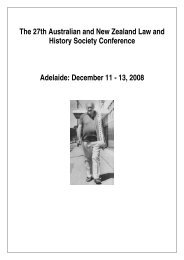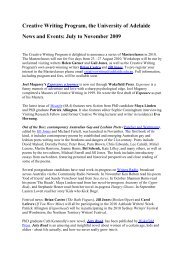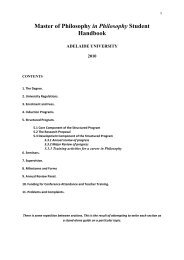Introduction - Faculty of Humanities & Social Sciences
Introduction - Faculty of Humanities & Social Sciences
Introduction - Faculty of Humanities & Social Sciences
Create successful ePaper yourself
Turn your PDF publications into a flip-book with our unique Google optimized e-Paper software.
Introdu ctio n 12<br />
transforming the inputs <strong>of</strong> a stimulus, which may be quite complex, into the outputs <strong>of</strong> a<br />
certain (<strong>of</strong>ten unspecified) kind <strong>of</strong> behaviour, either relatively directly or via interaction with<br />
other mental states.<br />
Theoretically at least, the set <strong>of</strong> relations believed to constitute the function (cognition,<br />
mentality) can be instantiated in any sort <strong>of</strong> physical system, natural or artefactual, not just in<br />
a brain or nervous system. The function thus is said to be ‘multiply realizable’, capable <strong>of</strong><br />
instantiation in different physical media. In short, philosophical functionalism holds that<br />
mechanisms (physiological or otherwise) are not what make cognitive states cognitive; what<br />
makes cognitive states cognitive is, rather, an (unspecified) abstract set <strong>of</strong> relations that<br />
constitutes the functional role relative to the generation <strong>of</strong> (unspecified) types <strong>of</strong> behaviour.<br />
Mechanisms, according to philosophical functionalism, are implementation details and need not<br />
figure in the elucidation <strong>of</strong> a function. In biology, by contrast, mechanisms are the main game<br />
in just such an enterprise. The status <strong>of</strong> functionalism within the philosophy <strong>of</strong> mind, once<br />
unassailable, is under growing challenge (Foss 1995; Putnam 1997; Shapiro 2000; Polger 2004;<br />
Churchland 2005), not least for its lack <strong>of</strong> connection with empirical reality. This is as good a<br />
reason as any to withhold assent here.<br />
Talk <strong>of</strong> function invariably leads to talk <strong>of</strong> teleology, the purposes or goals that an activity<br />
or structure fulfils or subserves. Goal-directedness and normativity, both <strong>of</strong> which have many<br />
meanings, occupy a region <strong>of</strong> philosophy, both <strong>of</strong> mind and science, that has long stirred<br />
controversy and remains highly fraught (see, for example, Davies 2001). I will have more to say<br />
about this issue in Chapter 3. For now I will merely advert to three lines <strong>of</strong> argument that will<br />
figure in that discussion. First, even a cursory glance at the technical literature in biology,<br />
molecular biology and genetics/genomics demonstrates biologists routinely use teleological<br />
language (e.g., purpose, goal, ‘for’), which suggests the concept <strong>of</strong> goal-directedness is<br />
explanatorily useful. While I do not mean to suggest that anyone disputes the heuristic utility<br />
<strong>of</strong> such language, it is important to keep this in mind. Second, one <strong>of</strong> the signatures <strong>of</strong><br />
biological phenomena—what sets them apart from the phenomena studied by physics and<br />
chemistry—is their qualitative or relational nature (Mayr 1982); their highly organized,<br />
‘oriented’, ‘coherent’, and ‘constructive’ activity depends on information about other states <strong>of</strong><br />
affairs (Monod 1972:45). This inescapable, so-far-irreducible aspect <strong>of</strong> biological processes<br />
prompted the introduction <strong>of</strong> the term teleonomic, as an alternative to the philosophically<br />
loaded notion <strong>of</strong> teleology, by C.S. Pittendrigh (1958). Finally, the requirements <strong>of</strong> selfmaintenance<br />
and reproduction, combined with a history <strong>of</strong> evolutionary selection, determine<br />
that each type <strong>of</strong> organism responds to some aspects <strong>of</strong> its environment but not to others. As a<br />
result some environmental features are salient, or have value to the organism while others<br />
(indeed, vastly more) do not.<br />
Finally, I should be clear about what I will not do: I will not attempt a philosophical<br />
analysis <strong>of</strong> the natural-kind status <strong>of</strong> cognition. Two factors, in addition to radical polysemy,<br />
suggest this might be an unproductive strategy. First is growing philosophical scepticism about<br />
the utility <strong>of</strong> traditional natural-kind analyses <strong>of</strong> scientific concepts generally (Dupré 1981; Hull<br />
1965; Beer 1995; Griffiths 1999), but psychological concepts in particular (Charland 2005). 13<br />
Kornblith (1999) summarizes the dilemma thus: “That scientific taxonomies are simply more<br />
13<br />
Charland (2005) argues that the philosophical debate over the natural kind status <strong>of</strong> emotion, for example, “appears to have<br />
reached an impasse” (p.83). While some may believe this vindicates the notion that emotion is not a natural kind, Charland claims a<br />
declaration <strong>of</strong> victory would be pyrrhic, “because it is a ‘victory’ that has somehow—incredibly—managed to steer totally clear <strong>of</strong> the<br />
relevant issues in emotion science” (ibid).


